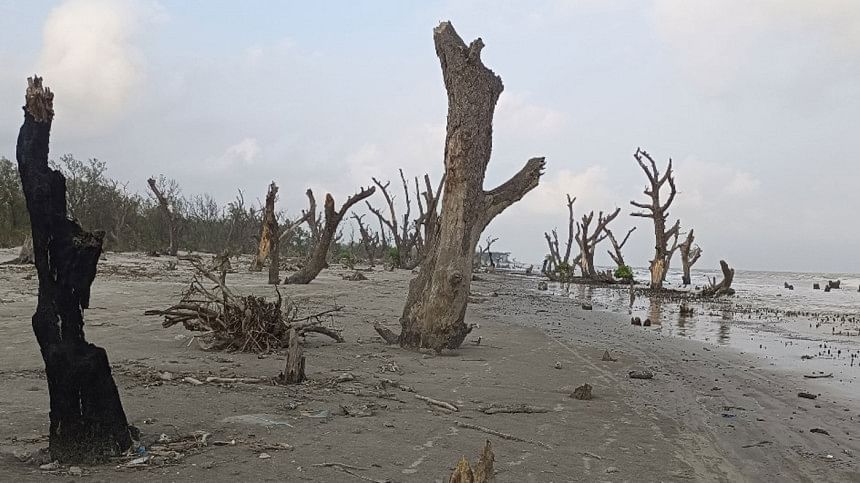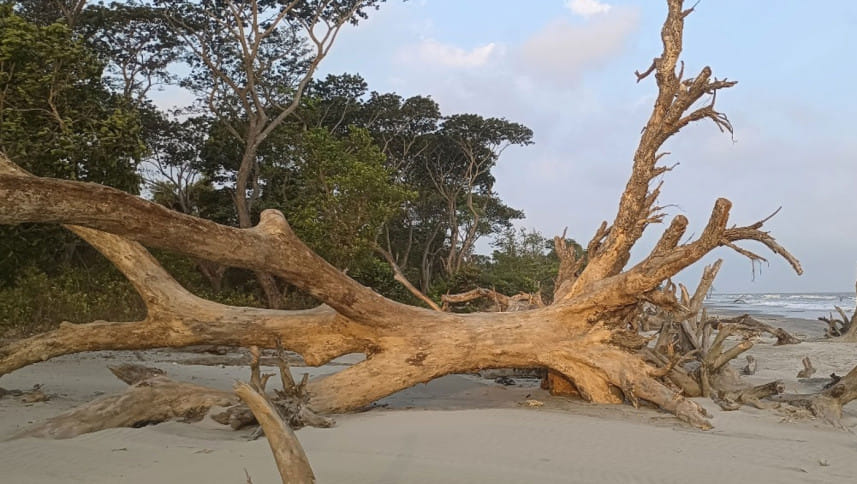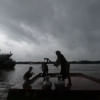A disappearing forest

At a time when efforts to combat climate change repercussions have intensified through forest conservation and extensive tree plantations, thousands of trees, across different species, are succumbing to adverse effects of climate change in the reserve forest area of Kuakata sea beach in Patuakhali district.
Alongside illegal tree felling by locals, the forest area is also shrinking gradually due to the trees dying in thousands, causing a further impact on the environment, and raising risk of substantial damage from natural calamities, including tidal surges, cyclones, and floods.
According to the Forest Department in Patuakhali, at least 10,000 trees die annually, mostly Kewra and Akashmani, across 20 acres of the forest area adjacent to the beach, due to the accumulation of sand that gets stuck to the tree roots.
They attributed this situation to climate change.
What was once a vast forest cover adjacent to the 18-kilometre-long beach, has lost around 2,000 acres of its area to the sea over the last 17 years since Cyclone Sidr in 2007.

Patuakhali Forest Department built an eco-park at a cost of Tk 2.76 crore across 13,984 hectares of forest area along Gangamati, Latachapoli, Khajura, and Fatra points on the beach in the 2005-2006 fiscal year. They also planted 42,000 trees of different species.
It had picnic spots, wooden bridges, culverts, and earthen roads. However, just around a year later, Cyclone Sidr destroyed many trees in the park, leaving behind a trail of devastation along the beach.
Subsequent calamities in later years, including cyclones Aila, Mahasen, and Amphan, further deteriorated the situation.
Around 2,00,000 trees, including coconut and palm trees that once adorned the forest, have disappeared during this time, as per the forest department data.
According to locals and forest officials, after Cyclone Sidr, the tidal water has risen significantly higher than before, flooding the forest area and causing sand accumulation.
"The trees on the beach saved our lives and properties during the cyclones. These trees began dying after Cyclone Sidr. As the number of trees is decreasing, our risk from calamities is growing," said Abul Hossain, a local fisherman.
Yunus Gazi, another local, said, "A section of people are felling the dead trees for wood while others are collecting the smaller logs and branches for firewood."
Rumman Imtiaz Tushar, president of Kuakata Tour Operators' Association, said, "The forest area and eco-park along the seashore had enhanced the beauty of Kuakata beach to a great extent. However, continuous erosion due to tidal water damaged the forest significantly over the years, and as such, the beach is also losing its natural beauty."
According to the Mohipur Range Office of the forest department, around 10,000 Akashmani trees were planted in 2008-09 in the Gangamati area, but those started dying as the roots got covered by sand brought in by tidal water.
A local gang sold many of those dead trees after stealing them from the forest. At least 25 cases have been filed in the last two years in this connection.
Shafiqul Islam, divisional forest officer in Patuakhali, said, "At present, only 1,300 acres of the once 3,387-acre forest area now remain while the rest have been lost to the sea. Over the years, around 10,000 trees of different species have disappeared from the forest."
Due to climate change and the rise in sea level, higher tidal water and sand accumulation in the forest area have been causing the trees to die, he said.
"A project aimed at mass forestation in the Kuakata area will begin soon," he added.

 For all latest news, follow The Daily Star's Google News channel.
For all latest news, follow The Daily Star's Google News channel. 








Comments